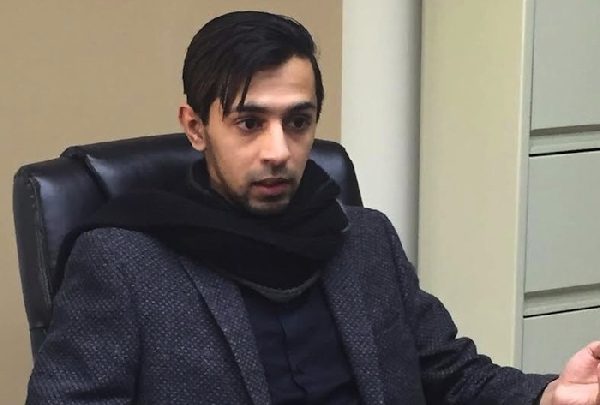
|
| Mohammed al-Nimr |
DEARBORN — Sheikh Nimr al-Nimr has become a symbol for dissent in Saudi Arabia. The Shi’a imam, whose execution on Jan. 2 drew international condemnation, was committed to peaceful activism and global human rights, his son Mohammed al-Nimr said.
Al-Nimr, 29, said the family is proud of the sheikh’s courage and sacrifice, stressing that his father promoted freedom for all, not only Shi’a rights.
The Saudi activist, who lives in the United States, also criticized U.S. foreign policy, denounced Saudi Arabia’s ultraconservative Wahhabi ideology and distanced himself from Iran, which expressed anger at Saudi Arabia after Sheikh al-Nimr’s death.
State of the kingdom
Al-Nimr slammed the U.S. reaction to the execution. The White House voiced concern after Sheikh al-Nimr’s death, without condemning it.
“It is a shameful stand,” he said. “To be fair, it is not the American stand, but the stand of the American government. I have witnessed a lot of sympathy and support from American society.”
Al-Nimr said the U.S. government claims to stand for freedom and justice, but remained silent when its Saudi allies killed a man who represents those values.
“My father defended the oppressed everywhere, in Yemen, in Bahrain, in Syria, in Tunisia, in Egypt,” he said.
Saudi Arabia is the top oil exporter in the world, but al-Nimr said average citizens are suffering from poverty and oppression. According to the sheikh’s son, only 30 percent of Saudis own homes. The global average for home ownership is 70 percent.
“The resources of the state are being robbed by one family,” he said.
Al-Nimr added that the cost of living is high, compared to the median income.
“The citizen cannot express his opinions,” he continued. “You may get arrested for the slightest word against a government minister or a member of the royal family.”
Al-Nimr said all Saudis are suffering from the government’s tyranny and corruption, but the government discriminates against Shi’a as a political ploy.
He said the monarchs use sectarianism to divide the people.
“The political authorities give a group of Wahhabis some powers to gain them on their side against Shi’a,” he said.
Al-Nimr said Shi’a and Sunnis coexist peacefully in many region in the kingdom, adding that Saudi Shi’a face harassment from the government, not fellow citizens.
ISIS sent suicide bombers to three Shi’a mosques over the past year, killing dozens. Al-Nimr said he fears for the fate of the Shi’a community from such attacks, but warned that violent extremists will not spare anybody.
“We need to tackle the source of the disease,” he said. “ISIS and Wahhabism and these terrorist jihadi organizations are all from the same cancerous tree, from Al Saud. They support this ideology because it legitimizes their grip on power.”
He added that destroying ISIS would not end global terror, as long as Riyadh supports extremist ideologies.
“Interests”
Following Sheikh al-Nimr’s execution, protests condemning the Saudi royal family rallied in cities across the world, including Dearborn.
The 29-year-old said that reaction was not surprising because his father, who was arrested in 2012, preached non-violence and defended human rights.
“The sheikh was alone,” al-Nimr said. “He did not have money or a petroleum empire, but his peaceful words reached everywhere.”
The escalating tensions between Saudi Arabia and Iran following the sheikh’s execution reached an alarming level that threatened regional peace. The kingdom cut its diplomatic ties with Iran after protesters attacked its embassy in Tehran the day of al-Nimr’s death.
“God’s hand of retaliation will grip the neck of Saudi politicians,” Iran’s supreme leader, Ayatollah Ali Khamenei, said about the execution.
This confrontation also fanned the flames of sectarianism and affected negotiation efforts in war-torn Yemen and Syria.
But Mohammed al-Nimr said geopolitics and international relations are irrelevant to the masses’ aspirations for freedom and justice.
“States pursue their interests,” he said. “There is hostility between the kingdom and Iran. That’s not new.”
He added that the Iranian government used the tragedy to advance its own agenda.
“It is not our business as individuals; we are harmed by this,” al-Nimr said. “We should be outside these equations. Human rights should not be in the political picture. Human rights activists should refuse to be pulled into these narrow political calculations.”
He added that political bickering in the name of religion is helping fuel sectarianism.
Referencing the Quran, al-Nimr said God has granted all humans fundamental rights and freedoms.
He denounced attacking the Saudi embassy in Iran, saying that defied his father’s peaceful message.
“We call for change with words,” he said. “We reject violence. If you want to achieve change with violence, what is the difference between you and those you are trying to change?”
Sheikh al-Nimr was critical of the Syrian government and described President Bashar Assad as a tyrant in one of his sermons.
Asked about Iran’s ties to the Syrian regime, Mohammed al-Nimr said, “How can an oppressive nation talk about human rights in another country?”
Al-Nimr rejected demonizing all Saudis because of the actions of their government. He said Wahhabis merely represent 20 percent of Gulf nations.
“The rest of society is kind; they don’t care if you are Sunni or Shi’a,” he said.
Mohamad al-Nimr was born in Syria, where he spent his early years. He lived between Syria and Saudi Arabia as a teenager. In 2010, he traveled to the United States, where he earned a degree in mechanical engineering from Indiana University–Purdue University Indianapolis. He currently resides in Indianapolis.
Al-Nimr said he will not return to Saudi Arabia out of fear of prosecution.
“Even if I go back and they don’t arrest me right away, it is a vengeful government,” he said. “They might ban me from traveling and arrest me later. It is not safe for me to go there.”






Leave a Reply